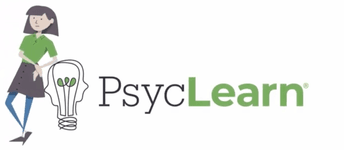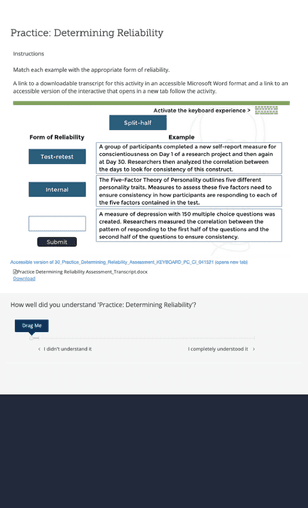No two students are the same, and their courseware should reflect that. PsycLearn is a complete, all-digital textbook alternative developed by the American Psychological Association (APA) to enrich research methods and statistics instruction. Informed by the latest findings in learning science research, PsycLearn was built with student immersion and content personalization at its core.
Brought to you by the American Psychological Association
Are you a higher education instructor or administrator interested in using PsycLearn to help your students succeed? See how PsycLearn integrates seamlessly with your learning management system (LMS), and reach out to your APA Partnership Manager to send a question, schedule a demo, or find out about pricing.
Download customer success stories, our PsycLearn brochure, the Table of Contents for available PsycLearn courseware, and an outline of how PsycLearn learning objectives align with the comprehensive goals set forth in the APA Guidelines for the Undergraduate Psychology Major Version 2.0.
750 First Street NE
Washington, DC 20002
www.apa.org
How Does PsycLearn Work for Me?
Flexible
Courseware
Engages students beyond the classroom so that I can make the most of my in-class instruction.
Student Learning Outcomes
Supports department-wide success with an emphasis on clearly stated learning objectives.
Time-Saving & Comprehensive
Allows me to focus on real-world application in the classroom, now that it's my turn to step in front of eager psychology majors.
Educating the Next Generation
Inspires tomorrow's psychology professionals, and engenders a more informed public.
How Does PsycLearn Work for Me?
Flexible
Courseware
Engages students beyond the classroom so that I can make the most of my in-class instruction.
Student Learning Outcomes
Supports department-wide success with an emphasis on clearly stated learning objectives.
Time-Saving & Comprehensive
Allows me to focus on real-world application in the classroom, now that it's my turn to step in front of eager psychology majors.
Educating the Next Generation
Inspires tomorrow's psychology professionals, and engenders a more informed public.
PsycLearn: Statistics for the Behavioral Sciences
PsycLearn:
Research Methods
Available Courseware
The Science Behind PsycLearn Courseware
Retrieval Practice
Recurring self-assessments paired with formative activities allow students to demonstrate their recall of material and enhance their future ability to remember targeted concepts.
Elaboration
PsycLearn content encourages students to explain new concepts and make connections with prior knowledge—prompting them to answer the question of why something works, not just how.
Metacognition
Strategically placed “Check your Understanding” evaluations and interactive metacognitive markers help students improve their judgments of learning.
Spaced Practice
Formative assessments and end-of-module learning summaries are integrated within each lesson, allowing students to reinforce their understanding of the material via spaced learning.
Dual Coding
To support verbal and visual learning pathways, PsycLearn integrates a multitude of channels to deliver a concept, including infographics, engaging videos, narrative descriptions, diagrams, and more.
Backward Design
Courseware is developed in a three-step process: defining measurable learning objectives, using Bloom’s Taxonomy to identify how content mastery will be assessed, and finally designing content to address both.
Concrete Examples
To help bridge the gap from an abstract to specific concept, material is conveyed through storytelling and real-life examples.
Interleaving
Courseware structure alternates between ideas and returns to prior concepts to link understanding between concepts, providing additional personalized support materials as needed.
Designed by a team of learning science researchers and seasoned instructors, PsycLearn’s personalized content is built based on applied cognitive science and evidence-based learning strategies.
“I asked students a single survey question at the end of the quarter—whether I should adopt PsycLearn, a print textbook, or nothing in the future—and 70% of the students said ‘leaning toward’ or ‘definitely’ PsycLearn.”
—Victoria Symons Cross, PhD,
Associate Professor of Teaching
University of California, Davis
“When I had the chance to take my psychology course with PsycLearn, it was a really refreshing change of pace. I had the opportunity to feel more engaged in the material, because the program structure feels like a much more comprehensive way to learn the information.”
—Michelle Kenstler, Student,
Lehigh Carbon Community College
“The variety of activities, demonstrations, and opportunities to practice their learning… keeps students engaged. Instead of spending lots of time entering things into a gradebook, I am better able to interact with my students when they need me most.”
—Roxanne Sullivan, PhD,
Professor & Program Director, Psychology, Sociology, & Women’s Studies, Bellevue University
“Since using PsycLearn, I’ve noticed that my students are more engaged with the material and, as result, are more successful in the course.”
—Professor Jason Reimer, PhD,
California State University, San Bernardino









